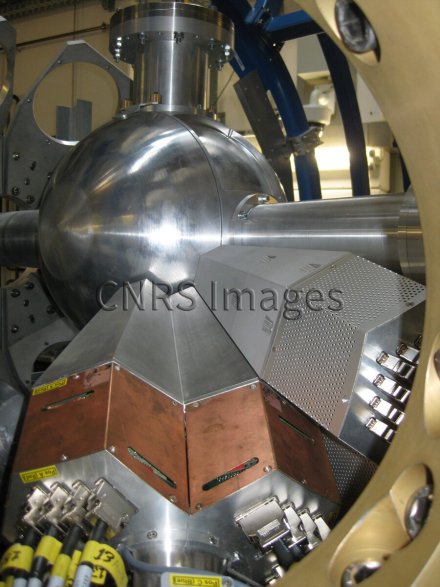Research program(s)
Production year
2012

© Emmanuel CLEMENT/CNRS Images
20140001_1574
Têtes des détecteurs de photons d'AGATA (Advanced gamma tracking array), un détecteur de rayon gamma, au GSI (Gesellschaft für Schwerionenforschung mbH) en Allemagne. Les détecteurs pointent vers la chambre à réaction, la sphère en aluminium au second plan. À l'interieur de cette chambre va se produire une collision entre un noyau accéléré par le GSI et un noyau cible. AGATA permet, grâce à un système de "tracking", de suivre le parcours d'un photon de façon précise en identifiant ses points d'impact, de façon à augmenter la sensibilité des mesures. La base du système de détection d'AGATA est composé de 23 monocristaux de germanium pur appelés "capsules". AGATA a été installé au Ganil (Grand accélérateur national d'ions lourds) à Caen, en juin 2014, pour une campagne de 2 ans. Il servira à comprendre l'origine et l'abondance de la matière nucléaire dans l'Univers.
The use of media visible on the CNRS Images Platform can be granted on request. Any reproduction or representation is forbidden without prior authorization from CNRS Images (except for resources under Creative Commons license).
No modification of an image may be made without the prior consent of CNRS Images.
No use of an image for advertising purposes or distribution to a third party may be made without the prior agreement of CNRS Images.
For more information, please consult our general conditions
2012
Our work is guided by the way scientists question the world around them and we translate their research into images to help people to understand the world better and to awaken their curiosity and wonderment.